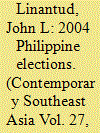|
|
|
Sort Order |
|
|
|
Items / Page
|
|
|
|
|
|
|
| Srl | Item |
| 1 |
ID:
061418


|
|
|
|
|
| Publication |
Apr 2005.
|
| Summary/Abstract |
This article, based on an analysis of the 2004 elections, argues that illiberal democracy in the Philippines rests on strong foundations. On one hand, bad government, armed men, and the mainstreaming of military activism and People Power have deepened the illiberal strain of political culture since the ouster of strongman Ferdinand Marcos in 1986. On the other hand, the reassertion of democratic nationalism by prominent institutions and public opinion, and new technologies and types of representation, have reinforced a democracy that rests on relatively solid footing even though it may often appear on the brink of collapse. Public religion illustrates the complexity of these issues. If one defines “liberal” as seeking to change the status quo, the Catholic Church has become one of the country’s most liberal institutions because it has challenged a frequently abusive and kleptocratic state for secure elections and basic rights.
|
|
|
|
|
|
|
|
|
|
|
|
|
|
|
|
| 2 |
ID:
084985


|
|
|
|
|
| Publication |
2008.
|
| Summary/Abstract |
This paper compares the failures and successes of nation-building in South Korea, South Vietnam, Philippines, and Thailand between 1954 and 1991. The primary argument is that several key elements of Cold War geopolitics interacted with each other, and the unique external and internal politics of each regime, to create divergent frameworks and margins for error that influenced the willingness and ability of each state to assume the burdens of nation-building. In all four states, moreover, the success of nation-building depended on finding the right balance between geopolitical pressure and protection to augment local narratives of security, nationalism, and legitimacy
|
|
|
|
|
|
|
|
|
|
|
|
|
|
|
|
|
|
|
|
|